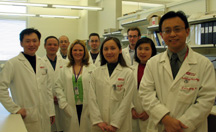Jialin Zheng, M.D., has produced ground-breaking research into the disease processes of AIDS-related dementia.
|
Dr. Gilmore was professor and chairman of the Department of Physiology and Biophysics from 1970 to 1987. He was funded by the National Institutes of Health for his entire career, supervised numerous graduate students and post-doctoral fellows, and published more than 200 scientific papers. The Joseph P. Gilmore Award was established by his department upon Dr. Gilmore’s retirement in 1987 to recognize outstanding research contributions by a faculty member. |
Ask Dr. Zheng about his successes, however, and the scientist in the Center for Neurovirology and Neurodegenerative Diseases, and Department of Pharmacology quickly shares the credit with those around him.
“In any research success, you need to have a great environment in which to work,” Dr. Zheng said. “The CNND and the Department of Pharmacology, as well as the Department of Pathology/Microbiology, all have a great environment for teamwork. Scientists with different expertise are working together to combat the same problem. This collaboration has made us very successful. Moreover, I have been very fortunate in attracting top notch scientists to be a part of my research program as well receiving support from an outstanding administrative staff.”
For Dr. Zheng and numerous others in the CNND, successes are coming in the area of HIV-associated dementia (HAD) and other neurodegenerative disorders. The chief of the Laboratory of Neurotoxicology at the CNND, Dr. Zheng has studied how macrophages, cells that protect the body from infection and noxious substances, interact with neuronal brain cells when HIV is introduced.
For his work, Dr. Zheng will receive the 2005 Joseph P. Gilmore Outstanding Investigator Award. After receiving his award, Dr. Zheng will present a lecture, beginning at 2:30 p.m. on Tuesday, March 15, in the Eppley Science Hall Amphitheater.
A native of China, Dr. Zheng received his medical and graduate training at Xuzhou Medical College, Nanjing Medical University and Shanghai Second Medical University. He came to the United States in 1992, and began postdoctoral research training at UNMC in the laboratory of Terry Hexum, Ph.D., professor in the Department of Pharmacology. He worked in Dr. Hexum’s lab for more than 3 years, and in the lab of Myron Toews, Ph.D., professor in the Department of Pharmacology, for another half-year.
 |
Jialin Zheng, M.D., far right, is the recipient of the 2005 Gilmore Award. Standing with him are the members of his lab, from right to left, Wei Zhuang, Nathan Erdmann, Hui Peng, M.D., Nick Whitney, Shelley Herek, Kang Tang, M.D., Jianxing Zhao and Yunlong Huang. |
“These four years really provided me with a broad-based knowledge in neurochemistry, receptor pharmacology, and developmental neurobiology, especially in G-protein coupled receptors and signal transduction,” Dr. Zheng said. “I owe a great deal to Drs. Hexum and Toews. They helped me as friends, mentors and colleagues.”
Another person whom Dr. Zheng credits his success to is Howard Gendelman, M.D., the chairman of the Department of Pharmacology and director of the CNND. In 1996, Dr. Gendelman hired Dr. Zheng to join the CNND.
“Dr. Gendelman helped me to become an independently funded scientist, and to pass through the many obstacles required to achieve success,” Dr. Zheng said. “His leadership in making the CNND a successful research environment, his deep understanding of the science and his continuous support of a new generation of researchers were invaluable. He always encourages you to push your limitations, and he sets a great example by his own hard work and dedication.” Dr. Zheng said he would be remiss if he did not acknowledge the helpful support of Samuel Cohen, M.D., Ph.D., the chairman of the Department of Pathology/Microbiology. “I truly appreciated his encouragement and insightful suggestions throughout the years”, Dr. Zheng said.
In 2001, Dr. Zheng received funding as the principal investigator on an RO1 grant, which was renewed earlier this year. He also is the PI on a project within a program project grant and a grant that is part of the Centers of Biomedical Research Excellence (COBRE, Program director, Dr. Charles Wood at UNL) from the National Institutes of Health. Over the past several years, Dr. Zheng’s work has focused on the role that macrophages play in HIV-1 associated dementia. His work has resulted in substantial contributions toward the scientific understanding that macrophages play in HIV infection and neuronal demise caused by the disease.
“The work is important, because one day we’d like to use it to find treatments for important diseases such as HIV-associated dementia and Alzheimer’s,” Dr. Zheng said. “Thousands of scientists, including several at UNMC, are working hard in this area of research.”
When away from UNMC, Dr. Zheng enjoys spending time with his wife, Guimei Zhou, an instructor in Pathology/Microbiology, and their children, 14-year-old Kevin and 7-year-old Katie.
“I am very grateful for my family’s support, especially my wife’s. I have truly appreciated her not only for raising two lovely children but also her unfailing support throughout the years. She is a true soul mate, friend and colleague”, Dr. Zheng said.
He also plays Ping Pong, aids in the teaching of Chinese to youngsters, and has served as an interpreter in trade missions for former Gov. Mike Johanns along with UNMC Vice Chancellors Tom Rosenquist and Don Leuenbenger.
“It has been fun and a great opportunity to watch and learn from these leaders. It adds another perspective to your daily life”, Dr. Zheng said.
He doesn’t regret his decision to come to Nebraska, he said. “I truly enjoy it very much. First of all, I enjoy the environment at UNMC. The leadership is just outstanding and the people here help each other,” Dr. Zheng said. “As a member of the international community, I think Omaha is a great community. Nebraskans have great hearts. I truly enjoy the personal environment of this great community.”